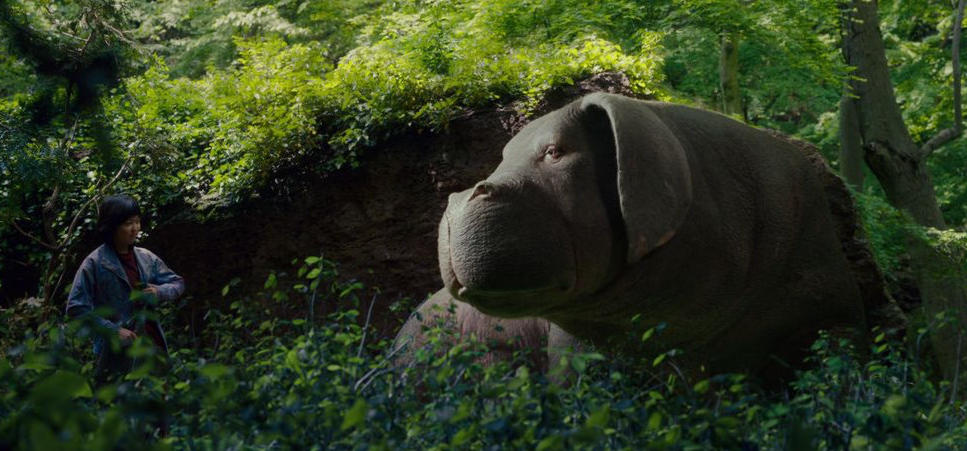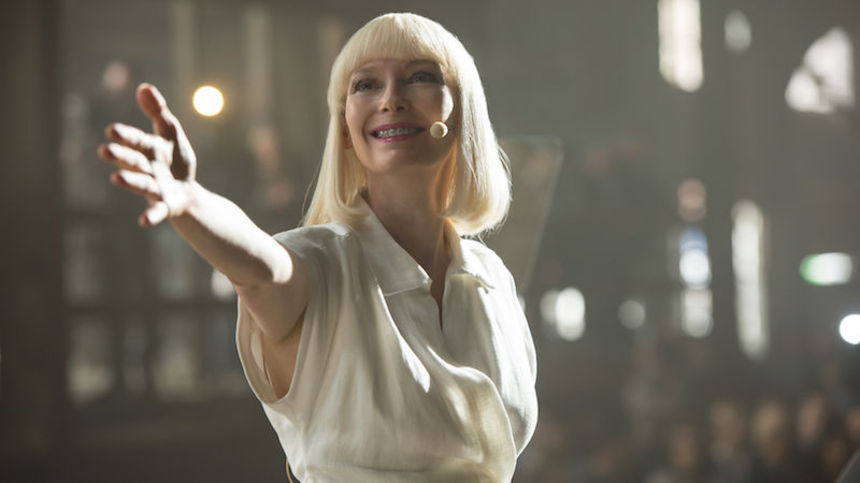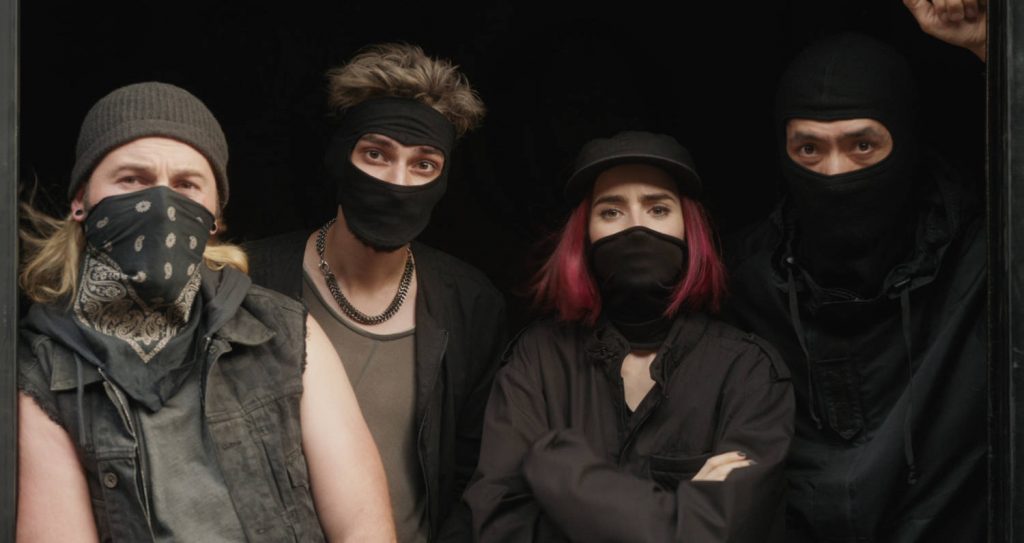
Okja and the Limits of Shame
Heavy spoiler alert! If you haven’t watched Okja, desperately want to, and read this review first, you really only have yourself to blame for what happens next.
Bong Joon-Ho’s 2017 film Okja tells the story of a young Korean girl, Mija (Ahn Seo-Hyun), trying to get her superpig Okja back from the Mirando corporation.

Along the way she crosses path with the activist group the Animal Liberation Front, who view Mirando’s superpig celebration as a way to unmask the corporation’s environmentally-friendly hypocrisy. The ALF’s plan is to humiliate both the corporation and its CEO Lucy Mirando (Tilda Swinton): for Lucy to change through the power of shame and embarrassment. What I want to do in this article is to talk a little bit about the power of shame and embarrassment as seen through the lens of Okja. This involves showing what can be accomplished through shame, but also what can’t.

So, first, what does the movie show us about Lucy Mirando and the Mirando corporation? After all, if shaming Lucy is an important part of this movie, then we have to establish what she’s being shamed for. Our introduction to both the corporation and its CEO begins with the first scene, and immediately suggests contrasts. Lucy Mirando, happy, upbeat, and dressed all in Apple-appropriate clean white addresses a group of journalists within a former industrial building. She announces a break from how her father used to run the company: he was a “terrible man,” who committed “atrocities” which stained the building’s walls “with the blood of fine working men.” In contrast, Lucy wants to signal a new commitment to “new core values” of “environment and life.”
To celebrate this new direction, she announces a competition and new product. They have discovered a new animal in South America: a superpig. These superpigs are an environmental wonder, consuming fewer resources and producing less waste. They have carefully reproduced 26 of these superpigs and sent them around the world to be raised in accordance with different local, traditional farming techniques. The superpigs will then be visited by Dr. Johnny Wilcox (Jake Gyllenhaal), a character best described as 'David Attenborough by way of Waluigi', who will declare a winner for 'Best Superpig'.

This opening scene tells us a lot quickly about Mirando, both the person and the corporation. They’re trying to make a transition from old way to new ways. The old ways are rough and brutal, represented not just by Lucy’s words but the rough building the press conference takes place in. They’re industrial, based on an opposition between the bosses and the workers. In contrast, Lucy’s new ways are friendly, cooperative, environmentally- and globally-conscious. The dour functional industrialism of her father has been replaced by the smiling, clean and well-animated Mirando of the present.
From this description you can probably guess the ALF’s motivation, and how the plot initially progresses. They want to show that the new Mirando corporation is not so different from the old. They want to show that Lucy’s stated values of a happier, more environmentally friendly Mirando are nothing but talk. To achieve this, they attach a secret camera to Okja’s ear which records nefarious goings-on at Mirando’s headquarters, including a drunken Dr. Johnny torturing Okja. These recordings are then broadcast at Mirando’s superpig celebration in downtown New York, showing the world that Lucy’s kinder, gentler façade is all hypocrisy. The ALF’s plan is that this will shame and embarrass both Lucy Mirando and the Mirando corporation, and that this will further the ALF’s goal of a more just society for non-human animals. But why should shame and embarrassment be expected to accomplish that?

To understand how the ALF expected to achieve their goals, it helps to know a few things about emotions in general. The first is that emotions often have objects, which are what the emotions are about. So when I am afraid I am not merely afraid, but I am afraid of some awful animal lurking in the shadows. When I’m proud the source of my pride is an accomplishment, like writing this blog post. Second, emotions prompt a response of some sort. Pride leads you to stand a little taller and maybe push your chest out. Fear leads you to run away. The third is that emotional experiences direct our attention at the object, and prompt us to search for reasons why that reaction might be well-founded. Returning to the fear example, the fear keeps my attention on the animal and prompts me to see whether or not it’s dangerous. If the animal is a ravenous wolf, then my fear is well-founded because the wolf is dangerous to me; if the animal is a hapless mouse then my fear is not well-founded because it’s not dangerous to me. This indicates a fourth thing about emotions, which is that what they have us looking for in the object is evaluatively important. So the fear leads me to evaluate the mouse as dangerous, and the pride leads me to evaluate writing this blog post as an accomplishment worth feeling good about. This evaluative characteristic of emotions is so important that some theorists have argued that emotions are a special kind of perception specifically for perceiving evaluative properties, though that’s not important for us now.[1] What’s important is that emotions have an object (they are about something), and they lead us to focus on this object and look for reasons which support that emotion’s relevant evaluation, and respond appropriately. Now let’s apply that to shame and embarrassment.
Shame and embarrassment are emotions we feel when we’ve done something wrong. There’s some disagreement as to whether they are genuinely different emotions, or just the same emotion experienced at different levels of intensity.[2] For the sake of this post and conceptual cleanliness, let’s stipulate a difference: embarrassment is for when you’ve done something wrong in the context of etiquette. It’s a social offence, but merely a faux pas. The sort of thing you’d probably feel comfortable laughing about if it happened to someone else. Shame, on the other hand, is for when you’ve committed a moral offence. These aren’t merely violations of etiquette, but instances of having done something seriously wrong.
If shame and embarrassment are about having done something wrong, then what they’re about — their object — is the thing we feel we’ve done wrong. We feel small and shrink away; where pride has us stand tall and beam, with shame and embarrassment we have trouble meeting people’s gaze. In fact, as with fear, there’s often the urge to run away from the social situation entirely. And, lastly, the reasons embarrassment and shame have us looking for are going to what made our action wrong. If embarrassing, which social rules did we violate? If shameful, what moral rules did we transgress?
Lucy’s new ways are friendly, cooperative, environmentally- and globally-conscious.
Understanding shame and embarrassment in this way, we can see more of what the ALF was trying to achieve. First of all, by shaming Lucy Mirando they aimed to make her confront that her actions were morally wrong, especially that the cruelty Mirando corporation was inflicting on animals was wrong and needed to be stopped. Even if Lucy was not necessarily susceptible to shame, the ALF also targeted her for embarrassment by showing her hypocrisy. She was failing to live up to her own ideals of a happier, friendlier Mirando corporation. Both of these reactions would be helped along by public outrage, a loud and vocal public who also see Mirando corporation as shameful and Lucy as embarrassed. This would ideally result in the behavioural effects of shame and embarrassment: Lucy Mirando and the Mirando corporation going away. So, how does that work out?
This is where the movie gets particularly interesting, and where Bong shows us what he thinks of as the limits of shame’s political usefulness.
Throughout the movie Lucy has been taunted in conversation by her sister Nancy. After the calamity at the superpig festival we finally meet Nancy to discover that she (also played by Tilda Swinton) is Lucy’s identical twin. But where Lucy is happy, upbeat, and defined by clean light colours Nancy is dark, scowling behind sunglasses, and wearing earth tones. She even talks with a growl as she tells Lucy that the board has decided to put Nancy in charge. Nancy’s first order of business? Ignore all press and send all the superpigs to the slaughter. Once the product is out, people won’t care how it got there if it’s cheap. Even Okja, the prize-winning best superpig is ordered slaughtered. Why? In Nancy’s words, “we can only sell the dead ones.”

The climax of the movie takes places at the slaughterhouse as Mija, along with Jay (Paul Dano) and K (Steve Yeun) of the ALF rush to save Okja from slaughter. Jay and K are caught by security and escorted out, just as Nancy arrives to oversee the start of the plant’s operations. They yell at her that she should be ashamed, but she doesn’t care. She first responds by shouting “fuck off! We’re proud of what we accomplish,” before eventually settling into apathy. Ultimately, she doesn’t care what Jay and K have to say. Mija does manage to save Okja, but only by bartering Nancy a golden pig in exchange. “Our first sale,” Nancy triumphantly declares, as she drops the golden pig in her pocket.
Shame, obviously, has no power over Nancy. Or, at least, Jay and K have no ability to shame her. She doesn’t care about their attempts to shame her because she doesn’t care about their standards, and they have no ability to make her care about their standards. She is not immoral so much as she’s amoral, a creature of pure capitalism pursuing profit and profit alone. This shows us one limitation of shame and embarrassment: they are social emotions that ultimately rely on the compliance of the person who would be shamed or embarrassed. If they’re not willing to correct their behaviour of their own volition, you need something extra to make them comply. But there’s more, too.
Once the product is out, people won’t care how it got there if it’s cheap.
Remember that Lucy and Nancy are identical twins, and the corporation carries their name. The ALF aren’t just trying to take on Lucy Mirando, they’re trying to take on the whole corporation. But in using the tactics of shame and embarrassment they can only defeat the part of Mirando that is susceptible to shame and embarrassment. That’s Lucy, who wants to do things better: friendlier, more eco-conscious, more animal friendly. But those features of Lucy, those parts that make her susceptible to shame, are not what the ALF is seeking to target. This leads to what Bong shows us in the film: the friendliness, the ecological consciousness, the general desire to ‘be better’ is simply jettisoned. The crude industrial mechanisms which grind everything to dust for profit persist.
Feeling shame and embarrassment is a pretty important part of living together. It’s a key part of treating each other better, and respecting the standards of others. But, Bong reminds us, this is deeply limited. It leads us to being better people, but the problems plaguing the world are deeper than the transgressions of people trying to be good. Mija may learn to be a vegetarian, but the Mirando machine grinds on. This is perhaps why Bong ends the movie where he does: with Jay and K leaving prison. They meet up with other members of the ALF on a bus before masking up for their next mission. The fight’s not done. We go again.
Footnotes
[1] You can find a survey of such views in the second chapter of Michael Brady, Emotional Insight (Oxford University Press: 2013).
[2] W Ray Crozier, Differentiating Shame from Embarrassment, Emotion Review 6, no.3 (2014): 271.
Further Reading:
If you want to read more about how emotions direct our attention and lead us to search for reasons, check out Michael Brady’s Emotional Insight (2013).
For more on emotions and evaluation, the Stanford Encyclopedia of Philosophy is good as always. See sections 5, 6 and 7 of their page on emotions.
No comments
Start the conversation…